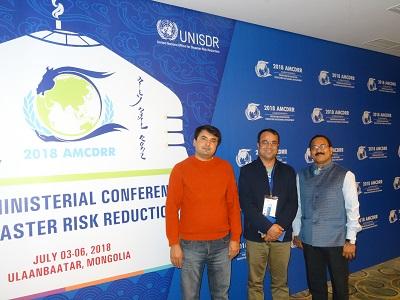
From left: Ali Nazar Nazari, Focus Humanitarian Assistance, Mohammed Qaseem Haidari, Afghanistan Deputy Minister, and Sarat Panda, DRR Advisor
By Denis McClean
ULAANBAATAR, 2 July, 2018 - War ravaged Afghanistan is making a nationwide effort to reduce its disaster losses from natural hazards despite conflict.
Consultations are continuing to put together a National Platform for Disaster Risk Reduction representing all of civil society before the end of the year.
The initiative was revealed today by representatives from the country’s Ministry for Disaster Management and Humanitarian Affairs, attending the Asian Ministerial Conference on Disaster Risk Reduction which officially gets underway tomorrow.
Afghanistan has appointed Mohammed Qaseem Haidari, Deputy Minister for Disaster Management and Humanitarian Affairs, as its national focal point for the Sendai Framework for Disaster Risk Reduction, the global plan to reduce disaster losses by 2030.
“We have three national priorities when it comes to development and these are the Sustainable Development Goals, implementation of the Paris Agreement on climate and the Sendai Framework for Disaster Risk Reduction,” said Mr. Haidari who is part of a strong Afghan delegation attending a UNISDR training session on the newly launched Sendai Framework Monitor.
With the strong backing of his Minister, Najib Aga Fahim, who arrives in Ulaanbaatar tomorrow, Mr. Haidari, said that consultations are ongoing at provincial level and there is an ambition to go down to district level wherever possible, in order to have both national and local strategies for disaster risk reduction in place, in line with the Sendai Framework’s target (e).
Sarat Panda, DRR advisor, said that the effort was gaining momentum in light of a drought which has hit 21 of the country’s 34 provinces affecting one million people. “The situation is not good. We are seeing a lot of migration from those areas.”
The country also suffers from flash floods, avalanches, landslides and earthquakes.